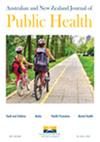What about 100% juice and non-sugar sweeteners? A national study of support for taxes, labelling and marketing bans applied to sugary drinks, non-sugar sweetened beverages and 100% juice in Australia
IF 2.4
3区 医学
Q2 PUBLIC, ENVIRONMENTAL & OCCUPATIONAL HEALTH
Australian and New Zealand Journal of Public Health
Pub Date : 2025-06-01
DOI:10.1016/j.anzjph.2025.100238
引用次数: 0
Abstract
Objective
To assess levels of support for potential policy interventions (labelling, banning marketing to children, taxes) to reduce sugar-sweetened beverage consumption; and to assess levels of support when these policies were extended to non-sugar sweetened beverages and 100% fruit juice.
Methods
Data, collected via a nationally representative online survey of Australian adults (N=2,876), measured support (5-point Likert scales; strongly/somewhat in favour/against, or neutral) for front-of-pack warning labels, banning marketing to children, and taxes, applied to the three beverages. Chi-square (unadjusted) and logistic regressions (adjusted) assessed support.
Results
Support was highest for sugar-sweetened beverage policies, followed by non-sugar-sweetened beverages, and lowest for juice. Across all beverages, support was highest for labelling (83%, 82%, 71%, respectively), followed by marketing bans (73%, 60%, 25%), and taxes (56%, 39%, 14%). Support was typically lower among younger, less educated, most socioeconomically disadvantaged and regular consumers.
Conclusions
Results indicate high receptiveness among the Australian community for beverage policies, especially warning labels, with lower receptiveness towards some policies targeting juice.
Implications for Public Health
These findings can inform the development of effective public health strategies for encouraging healthier beverage consumption, and point to prioritising front-of-pack warning labels, given the consistently high support for this policy.
100%果汁和无糖甜味剂怎么样?一项全国性的研究支持对含糖饮料、无糖饮料和100%果汁实施税收、标签和营销禁令。
目的:评估对潜在政策干预(标签、禁止向儿童推销、税收)的支持程度,以减少含糖饮料的消费;并评估当这些政策扩展到无糖饮料和100%果汁时的支持水平。方法:通过一项具有全国代表性的澳大利亚成年人在线调查(N=2,876)收集数据,测量支持度(5点李克特量表;强烈/多少支持/反对,或中立)支持包装前警告标签,禁止向儿童推销,并对这三种饮料征税。卡方(未调整)和逻辑回归(调整)评估支持度。结果:对含糖饮料政策的支持度最高,其次是无糖饮料政策,对果汁政策的支持度最低。在所有饮料中,对标签的支持度最高(分别为83%、82%和71%),其次是营销禁令(73%、60%、25%)和税收(56%、39%、14%)。年轻人、受教育程度较低、社会经济地位较低和普通消费者的支持率通常较低。结论:结果表明,澳大利亚社区对饮料政策的接受度很高,尤其是警告标签,对一些针对果汁的政策的接受度较低。对公共卫生的影响:这些发现可以为制定有效的公共卫生策略提供信息,以鼓励更健康的饮料消费,并指出在一贯高度支持这一政策的情况下,应优先考虑包装正面的警告标签。
本文章由计算机程序翻译,如有差异,请以英文原文为准。
求助全文
约1分钟内获得全文
求助全文
来源期刊

Australian and New Zealand Journal of Public Health
医学-公共卫生、环境卫生与职业卫生
CiteScore
4.20
自引率
5.70%
发文量
121
审稿时长
6-12 weeks
期刊介绍:
The Australian and New Zealand Journal of Public Health (ANZJPH) is concerned with public health issues. The research reported includes formal epidemiological inquiries into the correlates and causes of diseases and health-related behaviour, analyses of public policy affecting health and disease, and detailed studies of the cultures and social structures within which health and illness exist. The Journal is multidisciplinary and aims to publish methodologically sound research from any of the academic disciplines that constitute public health.
 求助内容:
求助内容: 应助结果提醒方式:
应助结果提醒方式:


